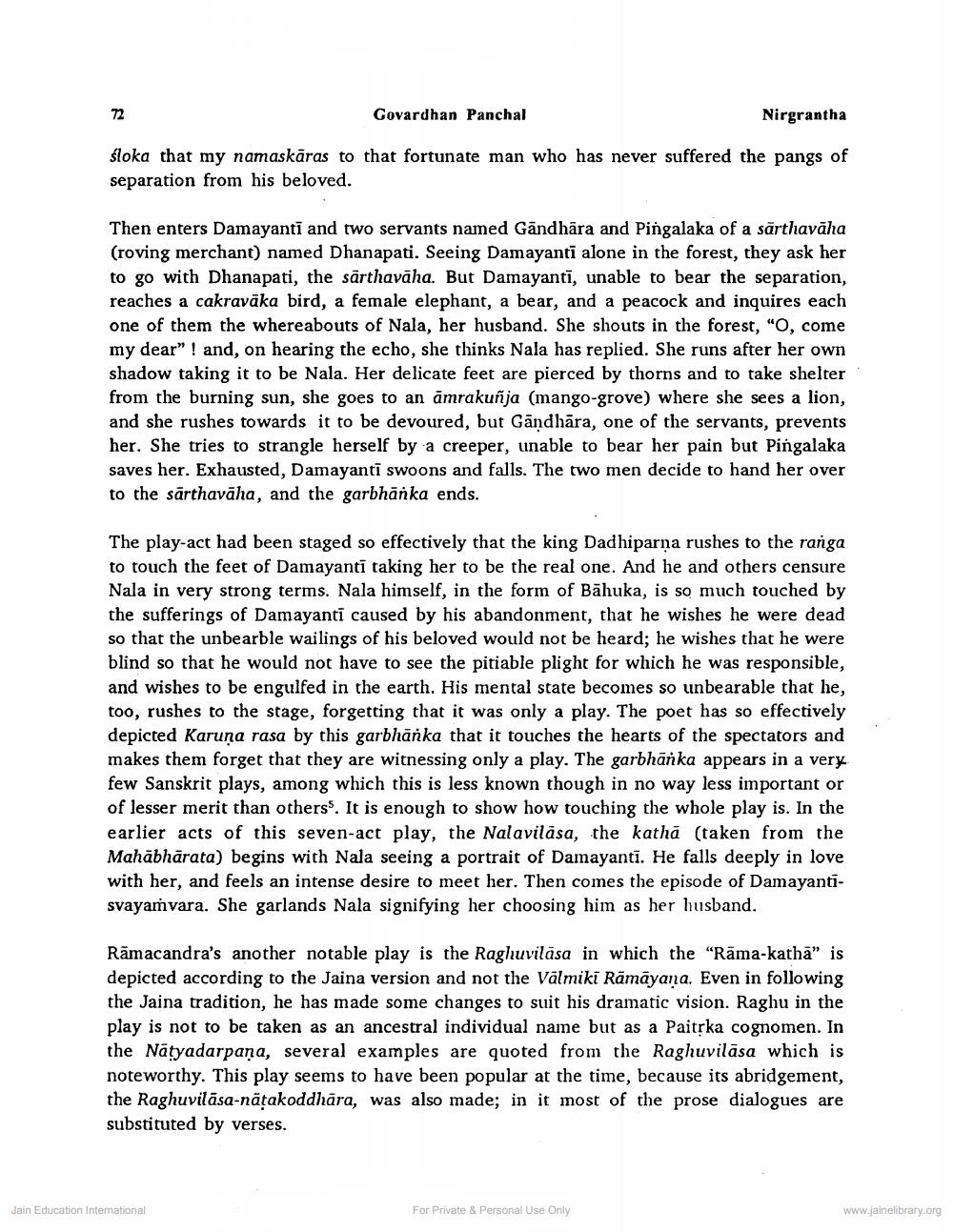________________
Govardhan Panchal
Nirgrantha
sloka that my namaskāras to that fortunate man who has never suffered the pangs of separation from his beloved.
Then enters Damayanti and two servants named Gāndhāra and Pingalaka of a sārthavaha (roving merchant) named Dhanapati. Seeing Damayanti alone in the forest, they ask her to go with Dhanapati, the sārthavāha. But Damayanti, unable to bear the separation, reaches a cakravāka bird, a female elephant, a bear, and a peacock and inquires each one of them the whereabouts of Nala, her husband. She shouts in the forest, "O, come my dear" ! and, on hearing the echo, she thinks Nala has replied. She runs after her own shadow taking it to be Nala. Her delicate feet are pierced by thorns and to take shelter from the burning sun, she goes to an āmrakuñja (mango-grove) where she sees a lion, and she rushes towards it to be devoured, but Gāndhāra, one of the servants, prevents her. She tries to strangle herself by a creeper, unable to bear her pain but Pingalaka saves her. Exhausted, Damayanti swoons and falls. The two men decide to hand her over to the sārthavāha, and the garbhānka ends.
The play-act had been staged so effectively that the king Dadhiparna rushes to the ranga to touch the feet of Damayanti taking her to be the real one. And he and others censure Nala in very strong terms. Nala himself, in the form of Bāhuka, is so much touched by the sufferings of Damayanti caused by his abandonment, that he wishes he were dead so that the unbearble wailings of his beloved would not be heard; he wishes that he were blind so that he would not have to see the pitiable plight for which he was responsible, and wishes to be engulfed in the earth. His mental state becomes so unbearable that he, too, rushes to the stage, forgetting that it was only a play. The poet has so effectively depicted Karuņa rasa by this garbhāńka that it touches the hearts of the spectators and makes them forget that they are witnessing only a play. The garbhānka appears in a very few Sanskrit plays, among which this is less known though in no way less important or of lesser merit than others. It is enough to show how touching the whole play is. In the earlier acts of this seven-act play, the Nalavilāsa, the kathā (taken from the Mahābhārata) begins with Nala seeing a portrait of Damayanti. He falls deeply in love with her, and feels an intense desire to meet her. Then comes the episode of Damayantisvayamvara. She garlands Nala signifying her choosing him as her husband.
Rāmacandra's another notable play is the Raghuvilāsa in which the "Rāma-kathā" is depicted according to the Jaina version and not the Vālmiki Rāmāyana. Even in following the Jaina tradition, he has made some changes to suit his dramatic vision. Raghu in the play is not to be taken as an ancestral individual name but as a Paitrka cognomen. In the Nātyadarpana, several examples are quoted from the Raghuvilāsa which is noteworthy. This play seems to have been popular at the time, because its abridgement, the Raghuvilāsa-nātakoddhāra, was also made; in it most of the prose dialogues are substituted by verses.
Jain Education Intemational
For Private & Personal Use Only
www.jainelibrary.org




